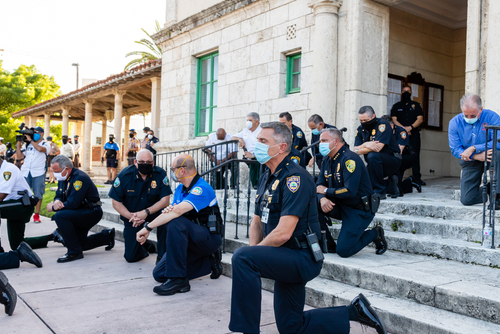Thousands of Cubans recently gathered at the U.S. Embassy in Havana, demanding the end of a decades-long trade embargo that they say cripples their economy.
Massive Protests Target U.S. Trade Embargo
Thousands of Cuban citizens in Havana aligned with their leadership to challenge the U.S. trade embargo. President Miguel Diaz-Canel and the former leader Raul Castro spearheaded the demonstration. Cuban authorities claim that 700,000 people participated in this monumental gathering, although independent verification remains absent. The protest served as a potent reminder to the world of the crippling impact the sanctions have had on the Cuban populace, said to be experiencing acute shortages of essentials like food and medicine.
Cuban president leads anti-Israel demo in front of US embassy in Havana
Tens of thousands of Cubans have staged a demonstration in front of the US embassy in Havana condemning Israel for committing “genocide” against Palestinians in Gaza.
The protest march on Thursday was led… pic.twitter.com/VmXPBj9c7W
— June12 Mandate (@Gen_Buhar) November 24, 2023
Cuban leadership places the onus on the U.S. sanctions that have been tightening since 1962 and further amplified during the first Trump administration. The reopening of diplomatic channels and dialogue appears ever more necessary as the nation’s economic woes persist. Notably, the U.N. votes annually on this embargo, urging a reassessment that seems long overdue from Cuba’s perspective.
.@DiazCanelB “We are free, sovereign and independent, and we are going to continue building our revolution, despite the tightening of the blockade…" #BloqueoGenocida @NBCLatino @NBCNews https://t.co/uBoD9Vicqq
— Cuban Embassy in US (@EmbaCubaUS) March 20, 2024
Political Tensions and Economic Strain
The protest came as the nation endures frequent electrical blackouts and soaring emigration rates, further highlighting the Cuban government’s urgent plea to lift the embargo. Cuban officials have expressed openness to discuss solutions, even extending a diplomatic hand to President Trump, who is scheduled to return to the political forefront soon. In his previous term, Trump reversed President Obama’s easing of relations by implementing 243 restrictive measures on the island nation, underscoring his hard-line stance.
Amid these political actions, Cuba was added back onto the list of countries that sponsor terrorism, an element that complicates the strategic dialogue sought by Cuba. Meanwhile, current U.S. President Joe Biden maintains Cuba’s designation on this list but has begun re-engaging with Havana on issues like counterterrorism and migration, hinting at potential grounds for diplomacy.
The Road Ahead for U.S.-Cuba Relations
The strife between the two nations lies deeply rooted in historical decisions that have long outlived their initial contexts, thus meriting reevaluation. As Cuba grapples with its economic crisis, the consensus among its leaders remains clear: lifting the embargo will invariably improve the standard of living for ordinary Cubans. Until either nation can find enough common ground to bridge their political divides, protests will likely continue, pressing for change.
Cubans voice their struggles amidst this geopolitical standoff, urging that change cannot come soon enough. As conversations around this complex and protracted embargo reemerge within political arenas, the spotlight remains on the urgency for relief experienced by the Cuban people.
Sources:
https://www.reuters.com/world/americas/cuba-stages-protest-us-embassy-over-sanctions-2024-12-20/
https://www.voanews.com/a/thousands-rally-at-us-embassy-in-cuba-against-trade-embargo/7909398.html

